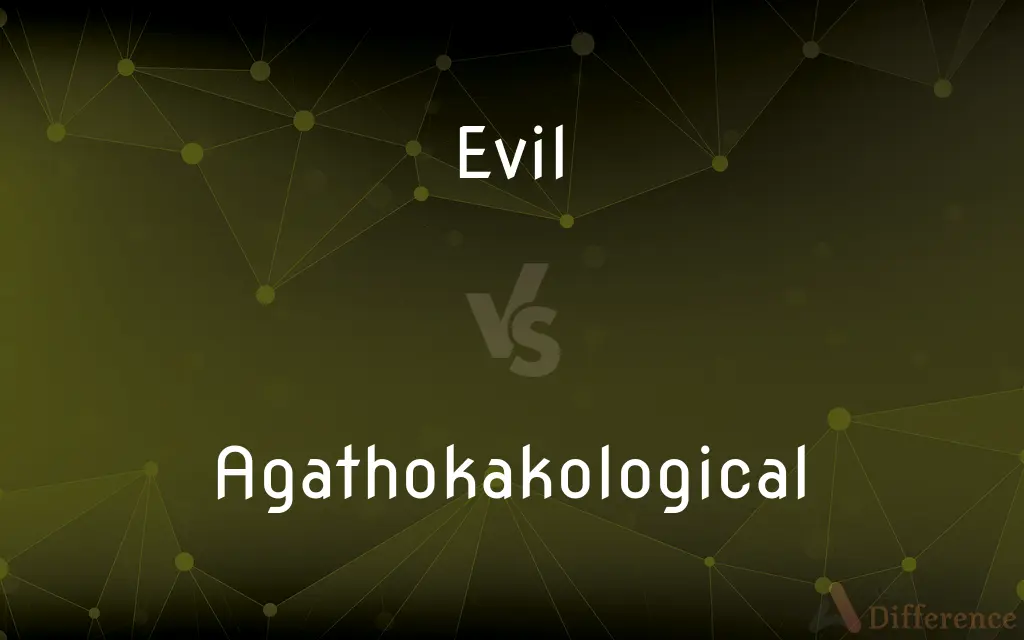Evil vs. Agathokakological — What's the Difference?
Edited by Tayyaba Rehman — By Fiza Rafique — Updated on April 25, 2024
"Evil" refers to something profoundly immoral and malevolent, typically used in a broad sense, whereas "agathokakological" describes something composed of both good and evil elements, often used in more philosophical contexts.

Difference Between Evil and Agathokakological
Table of Contents
ADVERTISEMENT
Key Differences
"Evil" is a commonly understood term that signifies profound immorality, wickedness, and depravity, often in a general, broad sense that can apply to actions, individuals, events, or situations. On the other hand, "agathokakological" is a much less common term that specifically describes the mixture of good (agatho) and evil (kakological) within something, emphasizing the coexistence of these opposing qualities.
While "evil" is used in everyday language and is a staple in religious, ethical, and philosophical discussions, "agathokakological" appears primarily in academic or philosophical discourse, highlighting its specialized use and the complexity of things being simultaneously good and bad.
"Evil" often carries a strong emotional connotation, suggesting something or someone to be avoided or condemned, whereas "agathokakological" is more neutral, analytical, and descriptive, focusing on the nature of duality without the immediate judgment or emotional weight.
In literary and cultural studies, "evil" is a central theme in countless narratives exploring the nature and consequences of malevolence, while "agathokakological" might be used to describe characters, plots, or themes that embody a nuanced blend of moral and immoral qualities, adding depth and complexity to the analysis.
The application of "evil" in moral and legal contexts usually signifies clear, often universally agreed-upon wrongs, while "agathokakological" might be applied in philosophical or ethical arguments where the interplay of good and evil within specific contexts or actions is considered.
ADVERTISEMENT
Comparison Chart
Definition
Profound immorality, malevolence
Combination of good and evil elements
Usage Frequency
Common
Rare, mostly philosophical
Emotional Connotation
Strongly negative
Neutral, analytical
Contexts
General, everyday language
Academic, philosophical
Application in Analysis
Often used to denote clear malevolence
Used to describe nuanced moral complexities
Compare with Definitions
Evil
Profoundly immoral and wicked.
The villain’s plan was purely evil.
Agathokakological
Made up of both good and evil.
The agathokakological nature of his actions made them unpredictable.
Evil
Bringing or resulting in misfortune.
He considered the lost money an evil omen.
Agathokakological
Describing a mixture of benevolent and malevolent elements.
The novel’s protagonist is an agathokakological figure, complex and conflicted.
Evil
Harmful or tending to harm.
The disease was an evil that devastated many communities.
Agathokakological
Characterizing something as neither wholly good nor entirely evil.
His legacy is agathokakological, celebrated by some and condemned by others.
Evil
Unpleasant or repulsive.
They heard an evil laugh in the dark alley.
Agathokakological
Relating to the combination of moral and immoral qualities.
The policy’s agathokakological outcomes were hotly debated.
Evil
Marked by anger or irritability.
She gave him an evil glare.
Agathokakological
Pertaining to the duality of good and bad.
Philosophers debate the agathokakological aspects of human nature.
Evil
Evil, in a general sense, is defined by what it is not—the opposite or absence of good. It can be an extremely broad concept, although in everyday usage it is often more narrowly used to talk about profound wickedness.
Agathokakological
(rare) Composed of both good and evil.
Evil
Morally bad or wrong; wicked
An evil tyrant.
Evil
Causing ruin, injury, or pain; harmful
The evil effects of a poor diet.
Evil
Characterized by or indicating future misfortune; ominous
Evil omens.
Evil
Bad or blameworthy by report; infamous
An evil reputation.
Evil
Characterized by anger or spite; malicious
An evil temper.
Evil
The quality of being morally bad or wrong; wickedness.
Evil
That which causes harm, misfortune, or destruction
A leader's power to do both good and evil.
Evil
An evil force, power, or personification.
Evil
Something that is a cause or source of suffering, injury, or destruction
The social evils of poverty and injustice.
Evil
In an evil manner.
Evil
Intending to harm; malevolent.
An evil plot to brainwash and even kill innocent people
Evil
Morally corrupt.
If something is evil, it is never mandatory.
Do you think that companies that engage in animal testing are evil?
Evil
Unpleasant, foul (of odour, taste, mood, weather, etc.).
Evil
Producing or threatening sorrow, distress, injury, or calamity; unpropitious; calamitous.
Evil
(obsolete) Having harmful qualities; not good; worthless or deleterious.
An evil beast; an evil plant; an evil crop
Evil
Undesirable; harmful; bad practice.
Global variables are evil; storing processing context in object member variables allows those objects to be reused in a much more flexible way.
Evil
Moral badness; wickedness; malevolence; the forces or behaviors that are the opposite or enemy of good.
The evils of society include murder and theft.
Evil lacks spirituality, hence its need for mind control.
Evil
Something which impairs the happiness of a being or deprives a being of any good; something which causes suffering of any kind to sentient beings; harm; injury; mischief.
Evil
(obsolete) A malady or disease; especially in combination, as in king's evil, colt evil.
Evil
(obsolete) wickedly, evilly, iniquitously
Evil
(obsolete) injuriously, harmfully; in a damaging way.
Evil
(obsolete) badly, poorly; in an insufficient way.
It went evil with him.
Evil
Having qualities tending to injury and mischief; having a nature or properties which tend to badness; mischievous; not good; worthless or deleterious; poor; as, an evil beast; and evil plant; an evil crop.
A good tree can not bring forth evil fruit.
Evil
Producing or threatening sorrow, distress, injury, or calamity; unpropitious; calamitous; as, evil tidings; evil arrows; evil days.
Because he hath brought up an evil name upon a virgin of Israel.
The owl shrieked at thy birth - an evil sign.
Evil news rides post, while good news baits.
It almost led him to believe in the evil eye.
Evil
Anything which impairs the happiness of a being or deprives a being of any good; anything which causes suffering of any kind to sentient beings; injury; mischief; harm; - opposed to good.
Evils which our own misdeeds have wrought.
The evil that men do lives after them.
Evil
Moral badness, or the deviation of a moral being from the principles of virtue imposed by conscience, or by the will of the Supreme Being, or by the principles of a lawful human authority; disposition to do wrong; moral offence; wickedness; depravity.
The heart of the sons of men is full of evil.
Evil
Malady or disease; especially in the phrase king's evil, the scrofula.
He [Edward the Confessor] was the first that touched for the evil.
Evil
In an evil manner; not well; ill; badly; unhappily; injuriously; unkindly.
It went evil with his house.
The Egyptians evil entreated us, and affected us.
Evil
Morally objectionable behavior
Evil
That which causes harm or destruction or misfortune;
The evil that men do lives after them; the good is oft interred with their bones
Evil
The quality of being morally wrong in principle or practice;
Attempts to explain the origin of evil in the world
Evil
Morally bad or wrong;
Evil purposes
An evil influence
Evil deeds
Evil
Having the nature of vice
Evil
Tending to cause great harm
Evil
Having or exerting a malignant influence;
Malevolent stars
A malefic force
Common Curiosities
Is evil always associated with negative outcomes?
Yes, in most contexts, evil implies negative, harmful, or undesired outcomes.
In what contexts might one encounter the term agathokakological?
Agathokakological is mostly used in philosophical, ethical, or academic discussions.
How might understanding agathokakological help in ethical debates?
It helps acknowledge the complexity and dual nature of actions or intentions, enriching ethical evaluations.
What does agathokakological mean?
Agathokakological describes something that consists of both good and evil elements.
How is the concept of evil generally used?
Evil is typically used to describe profound immorality, malevolence, or harm.
Can a person be described as agathokakological?
Yes, describing a person as agathokakological suggests they exhibit both commendable and reprehensible traits.
Is the use of evil or agathokakological more prevalent in literature?
Evil is more prevalent, though agathokakological can be used to describe complex literary characters or themes.
What distinguishes evil from agathokakological in moral discussions?
Evil refers to clear malevolence, while agathokakological refers to a more complex interplay of good and bad qualities.
Can a society be agathokakological?
Yes, a society can be considered agathokakological if it embodies both positive and negative characteristics.
How do evil and agathokakological relate to human nature?
Evil often denotes a part of human nature prone to wrongdoing, while agathokakological recognizes the mixed moral capacity.
What practical applications might agathokakological have?
It can be used in psychological assessments or philosophical discussions to explore the complexities of character and motivation.
Why might someone prefer using evil over agathokakological in communication?
Due to its familiarity and emotional impact, evil is more likely to be understood and evoke a clear response compared to the more nuanced and less known agathokakological.
Can the concept of evil be subjective?
Yes, what is considered evil can vary greatly depending on cultural, social, and personal beliefs.
Are there philosophical theories that reject the concept of evil?
Yes, some philosophical theories argue that evil is a social construct and advocate for understanding behaviors through other lenses.
Does the concept of agathokakological suggest balance?
It suggests a mixture or coexistence rather than a balance, highlighting the presence of both qualities without implying equilibrium.
Share Your Discovery

Previous Comparison
Planed vs. Planned
Next Comparison
Tricycle vs. BicycleAuthor Spotlight
Written by
Fiza RafiqueFiza Rafique is a skilled content writer at AskDifference.com, where she meticulously refines and enhances written pieces. Drawing from her vast editorial expertise, Fiza ensures clarity, accuracy, and precision in every article. Passionate about language, she continually seeks to elevate the quality of content for readers worldwide.
Edited by
Tayyaba RehmanTayyaba Rehman is a distinguished writer, currently serving as a primary contributor to askdifference.com. As a researcher in semantics and etymology, Tayyaba's passion for the complexity of languages and their distinctions has found a perfect home on the platform. Tayyaba delves into the intricacies of language, distinguishing between commonly confused words and phrases, thereby providing clarity for readers worldwide.













































